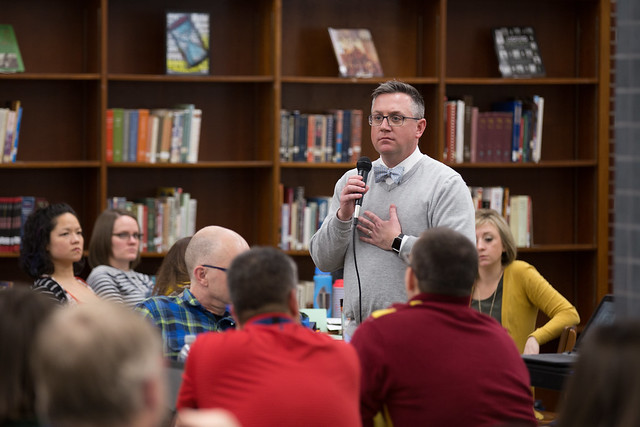There were no classes on Monday at Des Moines Public Schools. The day was devoted to “professional development” for teachers, the same reason schools dismiss early each Wednesday.
What exactly is PD, you might ask yourself from time to time.
Well, it’s nothing exactly. It’s a lot of different things that share a common denominator of helping teachers teach and, ipso facto, students learn and achieve. It’s time off for students that pays off later.
Yesterday we hopscotched around the district to peek in on some of the ways the time was spent.
Mike Lord is a Director of Elementary Schools at DMPS. His cohort of schools gathered on the Ankeny campus of Des Moines Area Community College for a day that included ongoing work around the Schools for Rigor model. It was a collaborative effort among schools that share many things in common, including the goal of successfully implementing an initiative designed to better support students in the classroom.
Meanwhile, the staff at Weeks Middle School on the Southside was also focused on the Schools for Rigor curricular model. Weeks was one of six schools that piloted a transition destined to go districtwide eventually. Now in their second year and gaining experience to build on, Weeks teachers are making progress that’s noticeable.
Gwen Bryant is the school’s lead staff developer assigned by Learning Sciences International and this was the latest in her series of visits to Weeks. Monday’s daylong session on teambuilding among students will be followed up by classroom visits on Tuesday to see principles in action.
“There’s been a shift in approach here at Weeks and I see evidence of it in the classrooms,” said Bryant. “Teaching is an apprenticeship profession. Teachers learn from each other, just like we are trying to get students to do. We coach the coaches.”
The cornerstone of Schools for Rigor is student-centered classrooms where teachers facilitate and students discover with an emphasis on collaboration.
Over on the west side of town, Roosevelt High School’s staff spent Monday morning on a 3D expedition that led to a candid, soul-searching afternoon in the school library.
“We were on a deep data dive this morning,” said Principal Kevin Biggs. “Some of what we found wasn’t pretty and now it’s time to talk about it.”
Much of the data Biggs shared with his teachers was gleaned from the Gallup Student Poll, which measures the hope, engagement, and well-being of students. In Roosevelt’s case, disparities were revealed between white students and minorities, particularly African Americans, that Biggs said are unacceptable.
“We talked about factors that are within our control versus ones that are not,” he said. “The bottom line is that we must overcome even those factors that are beyond our control. We need a change in this building to a whatever-it-takes-attitude. The status quo is not acceptable.”
Biggs challenged his staff to look in the mirror instead of pointing fingers, something he pledged to do more of himself. After his remarks he opened the floor for input and feedback – and there was plenty. There was laughter and there were tears. It looked and sounded and felt like at least the beginning of a catharsis that will lead to even better things from a school that already boasts a proud pedigree.
So, if you ever wondered if professional development is really a euphemism for glorified coffee breaks for teachers, it’s not.
“It’s the most important one and it’s also the hardest,” Biggs told his teachers about their job. They were back at it Tuesday morning.






